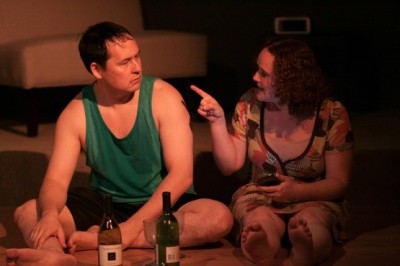The Devil’s Day Off
Directed by Ronan Marra
Music composed by Craig Winston
Produced by Signal Ensemble Theatre
Scenic Collage Greater than Sum of Its Parts
The Devil’s Day Off is a new work written by Signal Ensemble member John Steinhagen. It depicts bored, irritated Chicagoans during a 24-hour long power outage during a heatwave. As tempers flare and bodies wilt, we are treated to many sliver-thin slices of life.
The show opens with Craig Winston riffing soothingly on his guitar. Due to a technical issue, this lasted twice as long as it would normally, but that wound up not being a disaster. It created a relaxing atmosphere in which I could watch more than fifty scenes unfold, most of which depicted people feeling similarly sluggish. The scenes were generally, some even less than a minute. They provided a flash of feeling before dissolving. A lot of the characters came back later to build on something, while others were just one-shots. But I seldom felt that the characters had disappeared before I got to know them enough to understand their stories.
All the cast members give strong performances, though some get more developed characters or stage-time. Matthew J. Lloyd has the grimmest of the recurring characters in a mostly comedic play, playing a man suffering from mental illness and on his last nerve. Several squabbling couples appear, including Colby Sellers and Laila Abdo arguing over how to contact her elderly mother, who may have died in her apartment, and whether that would be bad. Nelson Rodriguez appears as part of one couple attending to his wife (Mary Jo Bolduc), who was injured in the outage-induced crime wave. He appears as a different character to tell his boyfriend (Tyler Rich) that he no longer loves him.
Indeed, many relationships break down, as people treat the outage like it’s the apocalypse, and they have to take advantage of this last opportunity to tell the truth. A few times that seems like a stretch, but most of the mini-meltdowns seem plausible. Some of the stories also have no apparent relation to the heatwave at all, such as a boy (Danny Mulae, also accomplished with the yo-yo) who flees his abusive family and moves in with his friends on his eighteenth birthday. Not every scene is a crises. Izis Mollinedo and Craig Winston share a nice picnic in the cemetery, which they’re apparently visiting out of boredom. Most of the couple scenes are successful because the actors are so easy to like and comfortable with each other. I felt least satisfied with the scenes of people praying alone in a spotlight. The first is an atheist who says since he lost faith in God he’d be willing to kill people. The rest are prayers in other languages, which still wound up sounding repetitive.
The program includes a note from Steinhagen saying the play is meant to be flexible and can be rearranged. Since he’s a company member and I doubt director Ronan Marra shut him out of the rehearsal process, I think you could call this as close as any production to the playwright’s intent. Buck Blue’s scene design is so resolutely blank the frames don’t even have pictures, they’re just painted over. There are a few locations-a stoop, some grass, rooms with mismatched chairs-but generally it’s up to the actors to make the scene. Their skill and costume designer Elsa Hiltner provide the only way to differentiate between characters, which isn’t terrible. I like that the people are a little mysterious. Give this show a look if you want a slice of life sampler platter or to support new work. Some of the stories could have been plays on their own, but combined with the other scenes, it creates a loving snapshot of the city.
Recommended
Jacob Davis
[email protected]
Reviewed October 31, 2014
For more information, go to The Devil’s Day Off’s page at Theatre in Chicago.
Playing at Signal Ensemble Theatre, 1802 W. Berenice Ave, Chicago. For tickets, call 312-226-6727. Runs October 18-November 22. Thursday, Friday, and Saturday at 8:00 pm, Sunday at 3:00 pm. Tickets are $23, or $15 for industry, students, seniors, and groups. Running time is ninety minutes without an intermission.




